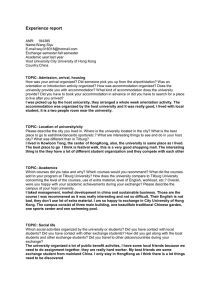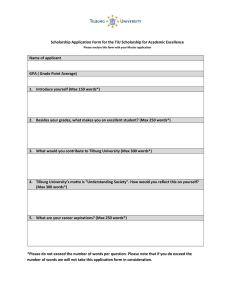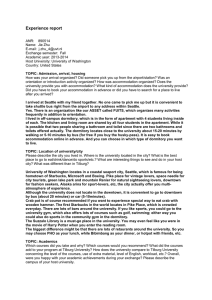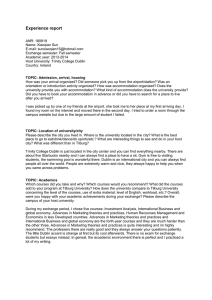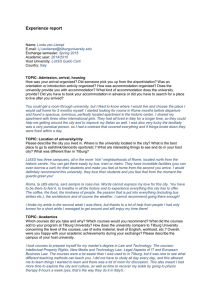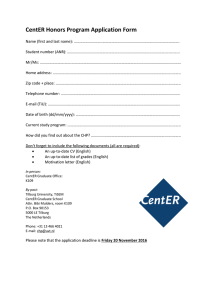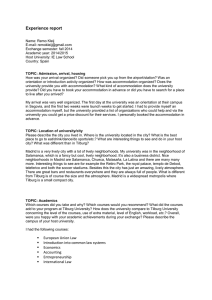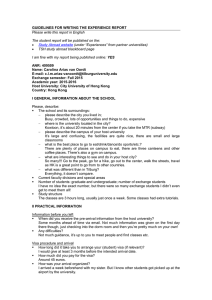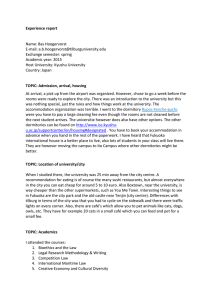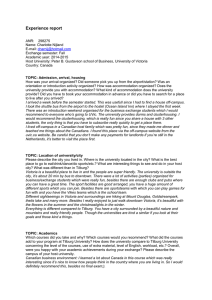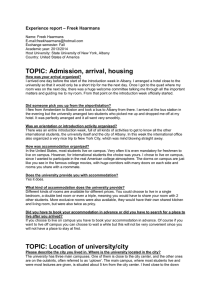Experience report
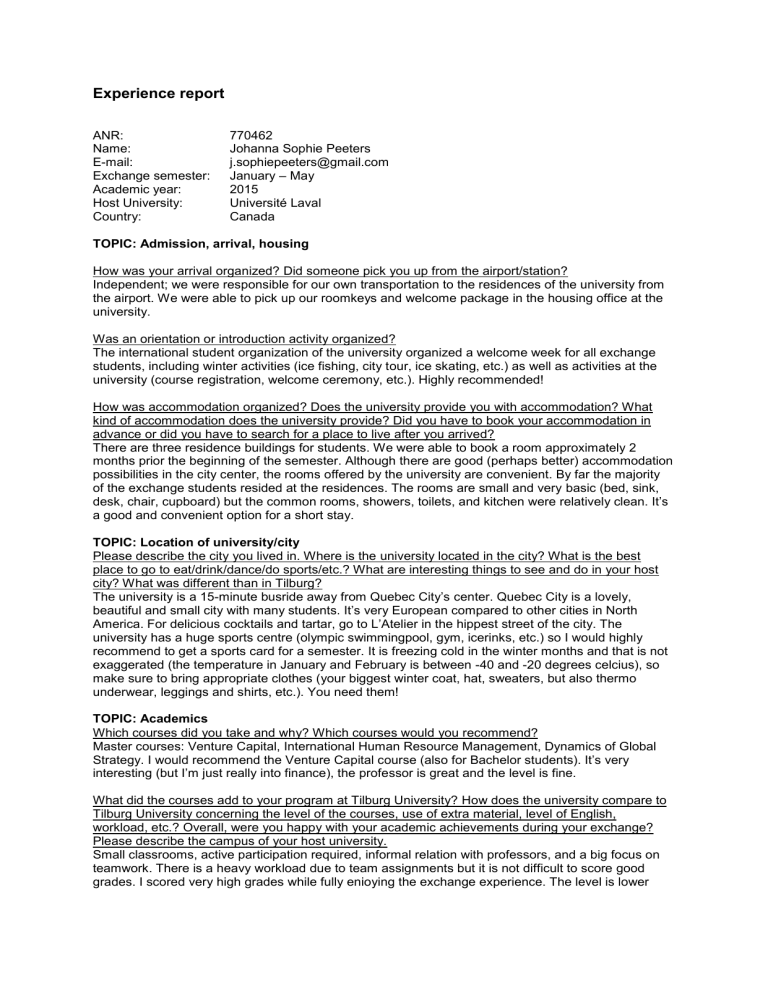
Experience report
ANR: 770462
Name: Johanna Sophie Peeters
E-mail: j.sophiepeeters@gmail.com
Exchange semester: January – May
Academic year: 2015
Host University:
Country:
Université Laval
Canada
TOPIC: Admission, arrival, housing
How was your arrival organized? Did someone pick you up from the airport/station?
Independent; we were responsible for our own transportation to the residences of the university from the airport. We were able to pick up our roomkeys and welcome package in the housing office at the university.
Was an orientation or introduction activity organized?
The international student organization of the university organized a welcome week for all exchange students, including winter activities (ice fishing, city tour, ice skating, etc.) as well as activities at the university (course registration, welcome ceremony, etc.). Highly recommended!
How was accommodation organized? Does the university provide you with accommodation? What kind of accommodation does the university provide? Did you have to book your accommodation in advance or did you have to search for a place to live after you arrived?
There are three residence buildings for students. We were able to book a room approximately 2 months prior the beginning of the semester. Although there are good (perhaps better) accommodation possibilities in the city center, the rooms offered by the university are convenient. By far the majority of the exchange students resided at the residences. The rooms are small and very basic (bed, sink, desk, chair, cupboard) but the common rooms, showers, toilets, and kitchen were relatively clean. It’s a good and convenient option for a short stay.
TOPIC: Location of university/city
Please describe the city you lived in. Where is the university located in the city? What is the best place to go to eat/drink/dance/do sports/etc.? What are interesting things to see and do in your host city? What was different than in Tilburg?
The university is a 15minute busride away from Quebec City’s center. Quebec City is a lovely, beautiful and small city with many students. It’s very European compared to other cities in North
America. For delicious cocktails and tartar, go to L’Atelier in the hippest street of the city. The university has a huge sports centre (olympic swimmingpool, gym, icerinks, etc.) so I would highly recommend to get a sports card for a semester. It is freezing cold in the winter months and that is not exaggerated (the temperature in January and February is between -40 and -20 degrees celcius), so make sure to bring appropriate clothes (your biggest winter coat, hat, sweaters, but also thermo underwear, leggings and shirts, etc.). You need them!
TOPIC: Academics
Which courses did you take and why? Which courses would you recommend?
Master courses: Venture Capital, International Human Resource Management, Dynamics of Global
Strategy. I would recommend the Venture Capital course (also for Bachelor students). It’s very interesting (but I’m just really into finance), the professor is great and the level is fine.
What did the courses add to your program at Tilburg University? How does the university compare to
Tilburg University concerning the level of the courses, use of extra material, level of English, workload, etc.? Overall, were you happy with your academic achievements during your exchange?
Please describe the campus of your host university.
Small classrooms, active participation required, informal relation with professors, and a big focus on teamwork. There is a heavy workload due to team assignments but it is not difficult to score good grades. I scored very high grades while fully enioying the exchange experience. The level is lower
than at Tilburg University but the professors are (mostly) interesting to listen to and their English is perfect.
TOPIC: Social life
Which social activities organized by the university or students?
The international student organization organized many activities during the semester and I encourage you to participate in as many as you can! We went to New York City and Toronto with a big group of exchange students but they also organized activities in and around Quebec City (dogsledding, for example).
Did you have contact with local students?
Yes, Canadian students were very kind and interested in hanging out with international students.
However, many were insecure about their English or were simply not taking the effort to try to speak
English.
Did you have contact with other exchange students? How did you get along with the local students and other exchange students?
Yes, there are many exchange students. The majority are from France and they all hang out together and not very willing to talk English. However, there are many other nationalities represented as well.
Did you travel to other places/countries during your exchange?
I mostly travelled in Canada: to Montreal and Toronto and the mountains for skiing. We also went to
New York City for a few days.
TOPIC: Living costs
How did you finance your exchange period, apart from the grant you received from Tilburg University?
What were your living expenses abroad like compared to Tilburg? What did you spend most of your money on? What would you advice future students to spend their money on? Please outline your approximate monthly budget whilst on exchange: housing, food, textbooks, etc.
I worked at the university to be able to finance my exchange period. I did not receive a grant from
Tilburg University. The rooms in the residences are cheap (around 270 euros per month) but food
(especially the healty kind) is very expensive. Alcoholic beverages are also very expensive. I spent most of my money on the trips organized by the international student organization and I advise you to do the same. You can buy second-hand text books in the campus store, much cheaper!
TOPIC: Culture
Did you experience culture shock while on exchange? How would you compare your host culture to your own culture? What did you learn about your own culture while on exchange? What was different about your host culture than you expected? What did you like and not like about your host culture? Do you feel you learned a lot about your host culture, and if not, what would you like to learn more? How would you describe your host countries culture? If you travelled to other cities/countries during your exchange, were they different than your host city/country, and how?
No, it is not a difficult culture to adapt to. Except for the cold. Because you cannot imagine what -40 degrees celsius feels like without having experienced it yourself.
The Canadian people are very friendly (much friendlier than the Dutch in general) and always willing to help.
TOPIC: Personal development
What did you learn from the people you met during your exchange? Would you do things differently if you had the chance, and what would you do differently? What was your best experience, and what was your worst experience? What will you remember for ever about your exchange period? What was the most important lesson you learned about yourself during your exchange period?
To be open to learn about each other’s culture and also be respectful about the cultural differences. I would not do something different because I was pretty well prepared for the exchange period. My best experience was the introduction week where I got to meet the other exchange students and where I learned a lot about the Canadian culture. Worst experience: food poisoning in a bus from our way back to Quebec City to Toronto and limbs that turned blue due to the cold.
TOPIC: Tips for future students
Would you recommend an exchange period? Would you recommend your host university? What should prospective students bring with them/leave behind? What preparation is required for going on exchange to this destination? Was there anything you should have done in preparation that you didn’t do?
Yes, go on exchange! You will have a great experience at Université Laval. Bring warm clothes
(applicable for both semesters). I would recommend taking a French language course before going to this exchange destination. Local students and the inhabitants are often not able or not willing to speak
English.
TOPIC: A picture is worth a thousand words
If you took any pictures or made any videos that you would like to share with future exchange students, please include them (or e-mail them separately). Pictures that show your daily life or symbolize your exchange period are especially interesting for future exchange students.
Room in residence hall
Campus
